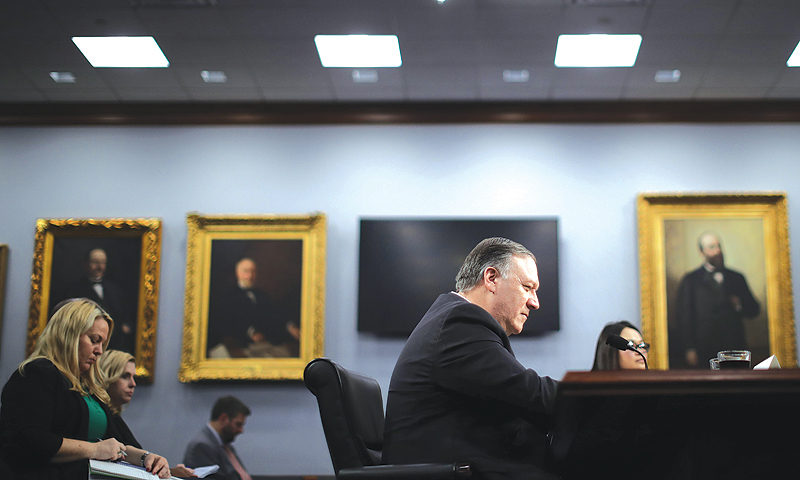Beijing slams US criticism of Muslim treatment as 'absurd'

BEIJING: China yesterday hit back at criticism from the United States' top diplomat who called its treatment of Muslims "shameful hypocrisy" after speaking with a former prisoner from a Chinese detention camp. US Secretary of State Mike Pompeo made the comment after meeting with Mihrigul Tursun, a member of the Uighur ethnic group who has spoken publicly in the US about what she said was widespread torture in China's prisons for the minority group. Beijing claims the camps are "vocational training centers" that provide language classes and employment, steering locals away from extremism.
Pompeo's comments are "extremely absurd and grossly interfere in China's internal affairs", said Chinese foreign ministry spokesman Geng Shuang at a regular press briefing. "Currently, the overall situation in Xinjiang society is stable … and all ethnic groups get along harmoniously," he said. "We urge the US to respect the facts … and stop the malicious smearing and groundless accusations against the Chinese side," Geng added.
As many as one million Uighurs and other mostly Muslim minorities are being held in internment camps in Xinjiang, according to a group of experts cited last year by the United Nations. Former detainees say they were detained for simply following Islamic traditions, such as having a long beard or wearing a veil. "China must release all those arbitrarily detained and end its repression," tweeted Pompeo, who had also met with relatives of those detained in Xinjiang.
After months denying the existence of the internment camps, Beijing last year launched a public relations campaign to defend its "training centers", organizing visits for diplomats and media from friendly countries. However, a delegation of three EU officials who visited Xinjiang in January as part of a carefully organized visit said they had the impression that the people they had spoken to in a "training centre" were reciting a dictated speech.
On Wednesday, Pompeo also criticized Beijing's trillion-dollar Belt and Road project after Italy decided to join China's "Silk Road" infrastructure initiative. He accused China of practicing "debt-trap diplomacy" with its state-owned or state-controlled enterprises only looking after their own interests. "The US side's statement is inconsistent with the facts," dismissed Geng. "No country sinks into a so-called debt trap because of their co-operation with China."
'Poisonous influence'
Meanwhile, China has said it is investigating other public security officials to "thoroughly eliminate the poisonous influence" of former Interpol chief Meng Hongwei, who is facing possible graft charges. Meng-who had also served as vice minister of public security-has been expelled from the Communist Party and his official positions while his case was handed over to prosecutors.
He had vanished last September during a visit to China from France, where Interpol is based, and was later accused of accepting bribes. The Public Security Ministry said in a lengthy statement late Wednesday that it held an internal meeting that "stressed that it is necessary to completely and thoroughly eliminate the poisonous influence of Meng Hongwei".
It said that Meng's expulsion was "all his own doing" and that he had used state assets to support his family's extravagant lifestyle, echoing a party anti-graft watchdog statement announcing his expulsion on Wednesday. All party cadres involved in Meng's case will be dealt with, the statement said, adding that it is "necessary to thoroughly eliminate the legacy of Zhou Yongkang and Meng Hongwei".
A former security tsar, Zhou was sentenced to life in prison in 2015 for bribery, abuse of power and leaking state secrets. Meng was appointed vice security minister by Zhou in 2004. Meng and Zhou are part of a growing group of Communist Party cadres caught in President Xi Jinping's anti-graft campaign, which critics say has served as a way to remove the leader's political enemies. More than one million officials have been punished so far during Xi's six-year tenure.- Agencies









